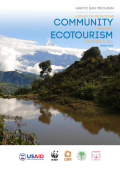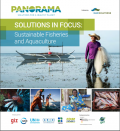This case study provides information on the social resilience of eight local community islands in North Ari Atoll, Maldives, and identifies differences in gender roles, resource use, and perception of environmental issues. This study is key in understanding the value of ecosystem services in one atoll in the Maldives.
Approximately 25 percent of the adult resident populations in North Ari Atoll took part in the social surveys carried out between August and December 2014 in all eight local community islands. Based on their main occupations, the respondents were categorised into three groups of resource users: 1) direct resource users (e.g. fishermen, dive guides, farmers), 2) indirect resource users (e.g. people employed by resorts or tourism companies), and 3) non-users of resources (e.g. teachers, administrators, unemployed people). The findings suggest that social resilience in North Ari is potentially high at the individual level (i.e. individuals are willing to learn new skills and change their current lifestyle and they are willing to comply with new regulations that government would put in place). However, a major obstacle at the community/island scale is the lack of alternative occupations to tourism and fisheries.



